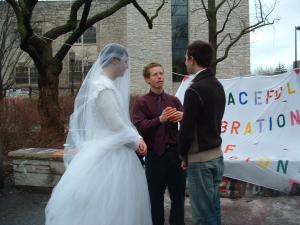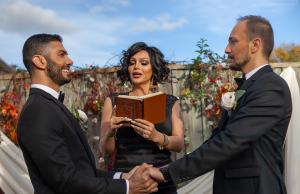 We saw last week that Phillip aided the Ethiopian eunuch in his search for the identity of Isaiah’s suffering servant as described in Is.53. It is Jesus of Nazareth, claims Phillip, and then he and the eunuch plunge into a nearby body of water in which the eunuch is forthwith baptized. In this fabulous story, Luke announces that being a eunuch (less than a full male—see Deuteronomy 23:1 and Isaiah’s repudiation of that idea in 56:3-4) or a foreigner are no final impediments to full participation in the assembly of Israel’s worship of God. In other words, Luke begins to say that the Christian community is fully inclusive of all persons; denial of that radical inclusivity is denial of the power of Christ.
We saw last week that Phillip aided the Ethiopian eunuch in his search for the identity of Isaiah’s suffering servant as described in Is.53. It is Jesus of Nazareth, claims Phillip, and then he and the eunuch plunge into a nearby body of water in which the eunuch is forthwith baptized. In this fabulous story, Luke announces that being a eunuch (less than a full male—see Deuteronomy 23:1 and Isaiah’s repudiation of that idea in 56:3-4) or a foreigner are no final impediments to full participation in the assembly of Israel’s worship of God. In other words, Luke begins to say that the Christian community is fully inclusive of all persons; denial of that radical inclusivity is denial of the power of Christ.
In today’s edition of the Los Angeles Times (March 16, 2021) I read of another horrifying and ridiculous attempt on the part of the Roman Catholic Church to exclude LGBTQ people from full inclusion in its assembly by denying such persons the sacramental blessing of the church for same-sex marriage. Once again, the church has denied the power of the gospel, and at the same time has spoken out of both sides of its hypocritical mouth. Listen to its hair-splitting attempt to justify its untenable position. “The presence in such relationships (LGBTQ couples) of positive elements, which are in themselves to be valued and appreciated, cannot justify these relationships and render them legitimate objects of an ecclesial blessing, since the positive elements exist within the context of a union not ordered to the Creator’s plan.” Whatever “positive elements” may be found in same-sex relationships (the document does not state what such elements may be), because they appear in a relationship that by its nature is, as the document says elsewhere, “intrinsically disordered,” can never receive the blessing of the church. I assume they mean, at least in part, that because same-sex relationships cannot produce children, they must be “intrinsically disordered.” This, of course, says nothing against those opposite-sex couples that cannot produce children due to some physical problem in one or the other of the couple. Are they too “intrinsically disordered?” Such “reasoning” is cankered and absurd. Science teaches now that homosexual relationships are no more “chosen” than heterosexual ones, and that God has created gay and lesbian persons in God’s own image, no less than God created heterosexual people in that image. No relationships between human beings are “intrinsically disordered,” though they may of course become disordered through various sorts of abuse, no matter the sex of the humans involved.
The reaction against the ruling, a ruling that has the approval of Pope Francis, was swift. Francis DeBernardo, executive director of New Ways Ministry, a German organization seeking greater acceptance of LGBTQ persons in the Roman church, said in reply, “Catholic people recognize the holiness of the love between same-sex couples and recognize this love as divinely inspired and divinely supported and thus meets the standard to be blessed.” Indeed, the hypocrisy of the document is palpable. On the one hand, the Pope has endorsed providing gay couples with legal protections in same-sex unions in reference to the civil sphere, but not within the church. When he was an Argentinian Cardinal, he supported legal protections for gay people in stable unions through a so-called “law of civil cohabitation.” These are loving couples living together, and in many countries now may marry legally, US America being one of those countries. But later in the article the anti-gay document is again quoted as follows: “The Vatican’s rationale for forbidding blessings of same-sex unions is that any union involving sexual activity outside of marriage cannot be blessed because it is not in a state of grace, or (in more churchy language) ‘ordered to both receive and express the good that is pronounced and given by the blessing.’” Well, if the couple is married, does that caveat not fall away? We then revert, I suppose, to the inability of a gay couple to produce children, but I have suggested above that that can be no clear criterion against blessing, simply because many heterosexual couples are similarly unable to produce children. In short, if I hear the document clearly, there are finally no real impediments against blessing same-sex unions. If the church objects, it can only be said to object on the grounds of pure bigotry against LGBTQ people.
I, as a United Methodist clergyman, know this sort of absurd “reasoning” all too well. Though we UM’s do not revert to the “child producing” argument, knowing that will hardly be in any way conclusive, we tend to leap on the 6 or 7 passages of Scripture that purport to reject same-sex relationships, though any number of scholars over the past two decades have called those biblical readings problematic at best and plain wrong at worst (I am one of those scholars). And besides all that Bible talk, the ancient writers knew precisely nothing about loving same-sex relationships, nor did they know anything about the huge complexities with regard to the understanding of gender and sexual orientation, imagining that “male and female” exhausted the subject. They were thoroughly wrong, and we know that now. No manner of out-of-context Bible readings will suffice to end this important and complex discussion.
In fact, any number of biblical passages raises the more basic question of the inclusive nature of the early church. Today’s text is one of those in the ongoing story of the Acts of the Apostles, focusing on the amazing and expanding element of full inclusion in the Christian community. The apostle Peter, good Jew that he was, assimilated into his understanding a traditional understanding that Gentiles were simply unwelcome in the Christian assembly unless they chose to present the outward signs of Judaism, circumcision and the consumption of proper foods. However, his actual experience with Gentiles caught up in the Holy Spirit of God taught him otherwise. “In truth,” he said,” I am grasping (the Greek verb is progressive present) that God is no respecter of appearances” (Acts 10:34). The more common translation of this seminal verse is “that God shows no partiality” (NRSV). The verb used appears to mean that merely on the basis of appearances, that is allowing extraneous factors to sway fair judgment, one cannot make judgments either for or against persons. God surely does not make any judgments on the basis of appearances, that is, God does not show partiality based on anything extraneous. And because that is so, Peter now comes to realize that simply being a Gentile is no restrictive condition that can deny the Gentile full inclusion in the early church through baptism. To be Gentile is not enough to exclude anyone from full Christian communion.
If that is true of Gentiles, it is equally true for LGBTQ persons. People who were made by God as LGBTQ persons cannot be excluded from absolute and free participation in the church of Christ. To exclude them on such extraneous grounds is precisely to erect boundaries and hurdles that are fully reminiscent of the Peter who had yet to transcend his own narrow views about Gentiles and the church. But in the light of Gentiles “speaking in tongues and extolling God” (Acts 10:46), he could no longer deny them baptism, despite their continued Gentile lives.
Both the Roman Catholic Church and the current United Methodist Church are completely in error in their twisted and hypocritical exclusion of LGBTQ people from the complete acceptance of such persons for church blessing and ecclesiastical support. In the case of the UM Church, its denial of marriage vows for LGBTQ couples, and its refusal to ordain such people, and to allow its clergy to perform such weddings is nothing less than a blasphemous assault on the God who bids all welcome to the kingdom, the reign of Christ. How long, O Lord, must it be before we see you in all our brothers and sisters? May it not be long; may it not be long!
(Images from Wikimedia Commons)











